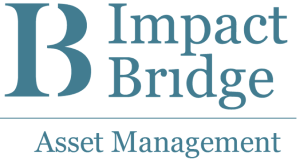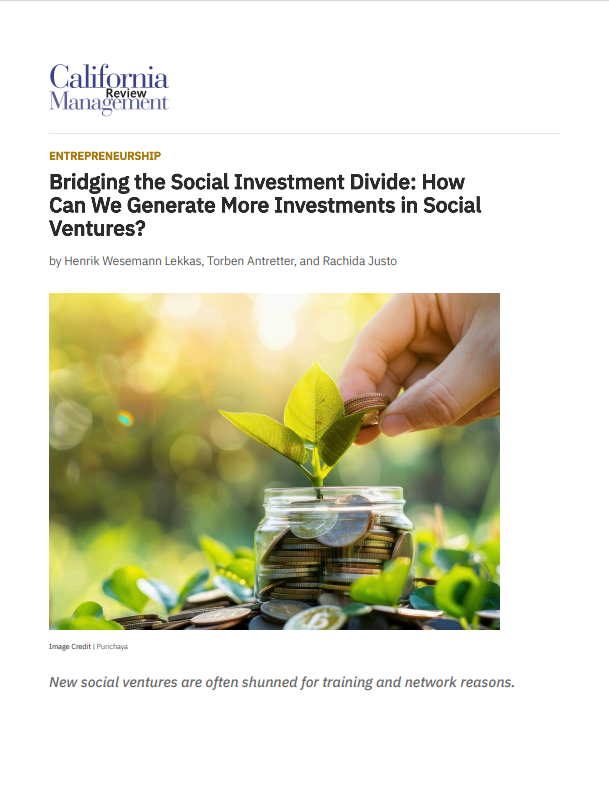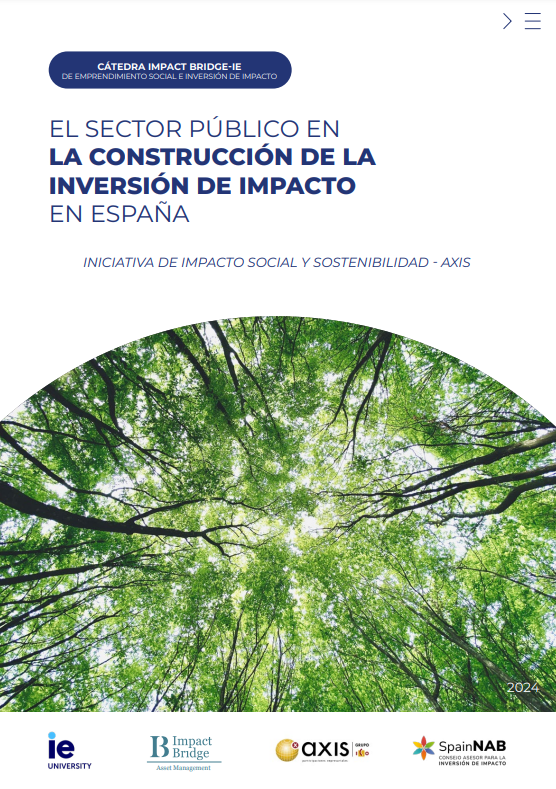Publications
Bridging the Social Investment Divide: How can we generate more investments in Social Ventures?
Authors: Henrik Wesemann Lekkas, Torben Antretter and Rachida Justo
This article was published in the California Management Review in September 2024
Despite their crucial role in addressing global challenges and promoting sustainable business development, social ventures fail to raise sufficient funds.
This article examines the reasons behind the low investment rates in these social enterprises and identifies three main strategies to help bridge the investment gap: improving financial transparency, simplifying social impact metrics, and leveraging investor networks.
In addition, the text highlights the importance of investor training, gaining experience in social investments, and building professional networks as key factors to increase social venture funding.
THE ROLE OF GRUPO ICO IN SHAPING THE SPANISH IMPACT INVESTING INDUSTRY
Authors: Impact Bridge-IE Chair of Social Entrepreneurship and Impact Investing; AXIS and SpainNAB
This article was published in May 2024.
Impact investing is becoming increasingly important in Spain, and the public sector is playing a key role in its development. In order to promote sustainable economic growth, entities such as Grupo ICO, and in particular its asset management arm AXIS, have been promoting and supporting impact investing since 2018.
In addition, this publication covers the initiatives of other public bodies, such as COFIDES and the European Investment Fund (EIF). Taking a practical approach, it also presents a selection of Spanish impact asset managers and examples of the companies they invest in.
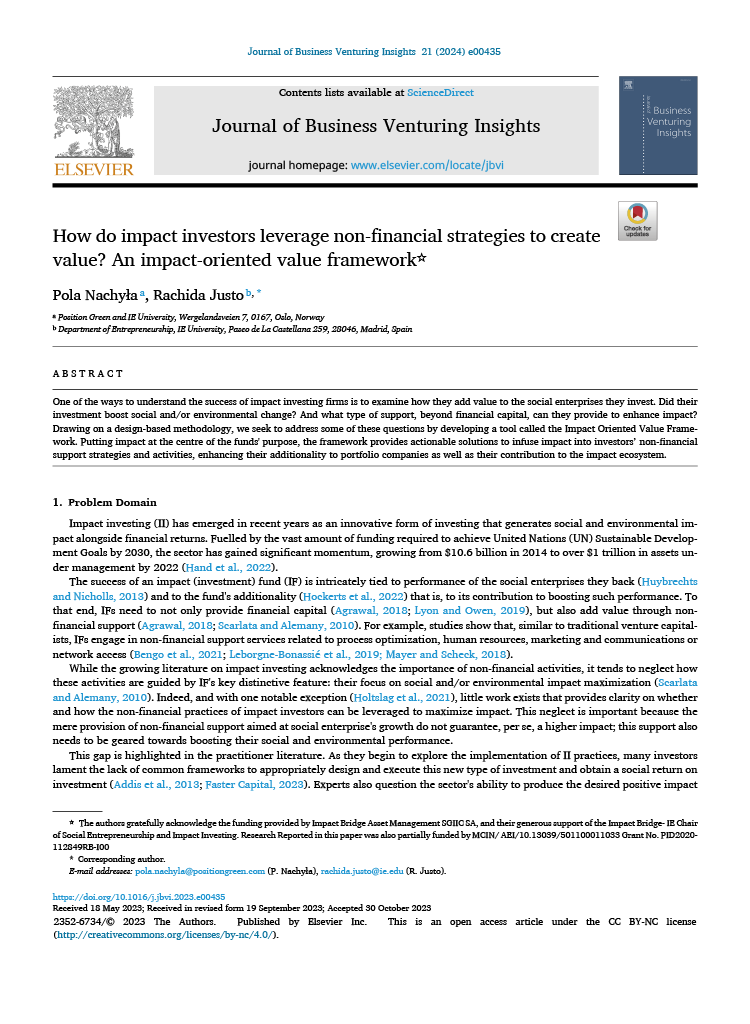
How do impact investors leverage non-financial strategies to create value? An impact-oriented value framework
Authors: Pola Nachyłaa, Rachida Justo
This article was published in the Journal of Business Venturing Insights in 2024.
We developed a tool called the Impact Oriented Value Framework seeking to address some questions concerning the way in which impact investing firms add value to the social enterprises they invest in.
Putting impact at the centre of the funds’ purpose, the framework provides actionable solutions to infuse impact into investors’ non-financial support strategies and activities, enhancing their additionality to portfolio companies as well as their contribution to the impact ecosystem.
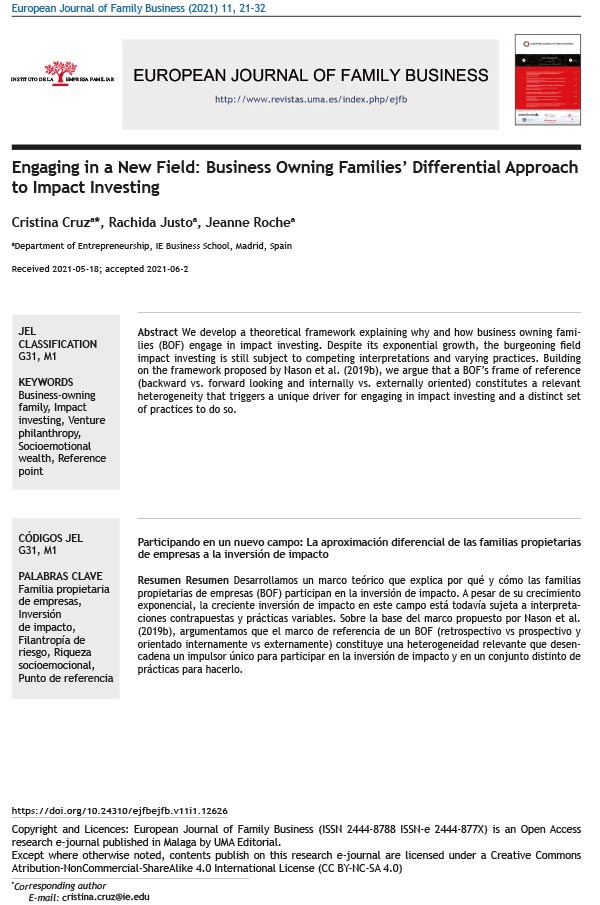
ENGAGING IN A NEW FIELD: BUSINESS OWNING FAMILIES’ DIFFERENTIAL APPROACH TO IMPACT INVESTING
Authors: Cristina Cruz, Rachida Justo and Jeanne Roche
This article was published in the European Journal of Family Business in November 2021.
We developed a theoretical framework that explains why and how business-owning families (BOFs) engage in impact investing.
Despite its exponential growth, the increasing impact of investment in this field is still subject to conflicting interpretations and variable practices.
Based on the framework proposed by Nason et al. (2019b), we argued that the framework of a BOF (retrospective vs. forward and internally vs. externally oriented) constitutes a relevant heterogeneity that triggers a single driver to engage in impact investing and a distinct set of practices to do so.
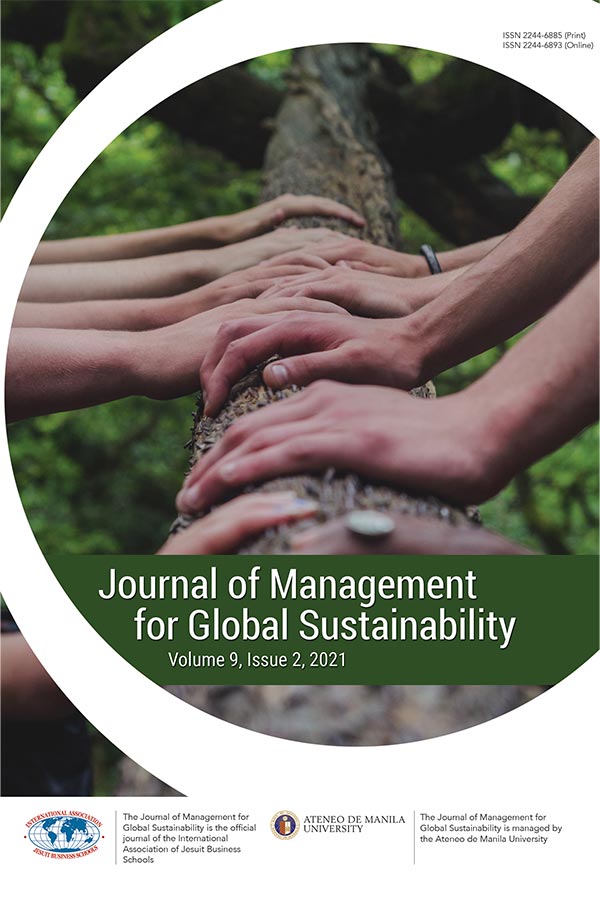
BEYOND THE BOUNDARIES OF DEFINITIONS Building an Effective, New and Multicriteria Impact Investing Assessment Tool
AUTHORS: BRAULIO PAREJA (IMPACT BRIDGE), CARMEN VALOR (COMILLAS PONTIFICAL UNIVERSITY), ARTURO BENITO (IMPACT BRIDGE)
This article was published in the Journal of Management for Global Sustainability in December 2021.
Impact funds need a tool that enables them to align their objectives with impact criteria. This study was developed by applying a multi-criteria decision method

HOW SOCIAL ENTERPRISES NURTURE EMPOWERMENT: A GROUNDED THEORETICAL MODEL OF SOCIAL CHANGE
Authorss: Braulio Pareja (Impact Bridge), José Luis Fernández (Universidad Pontificia Comillas), Álvaro Navarro (Impact Bridge)
This article was published in the Journal of Social Entrepreneurship in September 2020.
Through an ethnographic case study, we approached the understanding of social change in a South African company with a strong gender focus, detecting practices that led to the empowerment of women.
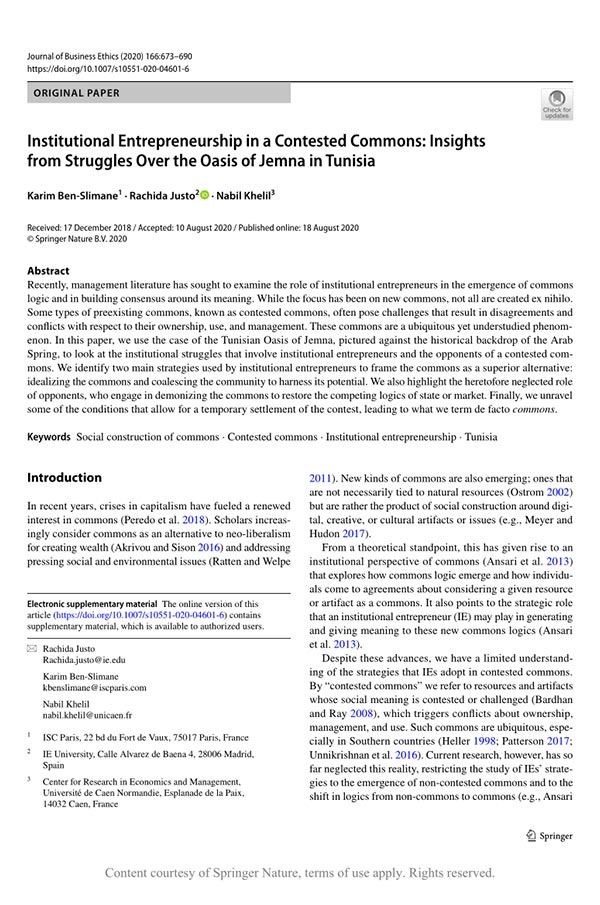
COMMONING AT CROSSROADS: A STUDY OF INSTITUTIONAL INCONGRUENCE IN A TUNISIAN OASIS
Authors: Karim Ben-Slimane, Rachida Justo & Nabil Khelil
This article was published in the Journal of Business Ethics in August 2020.
This article focused on the case of the Tunisian oasis of Jemna to analyze institutional struggles involving institutional entrepreneurs and opponents of the commons in dispute, against the historical backdrop of the Arab Spring. We identified two main strategies used by institutional entrepreneurs to frame the commons as a superior alternative: idealizing the commons and bringing the community together to harness its potential.
We also highlighted the hitherto neglected role of opponents, who concentrated on demonizing common goods to restore the competitive logic of the State or the market.
Finally, we unraveled some of the conditions that enabled the dispute to be temporarily resolved, giving rise to what we called de facto common goods.

